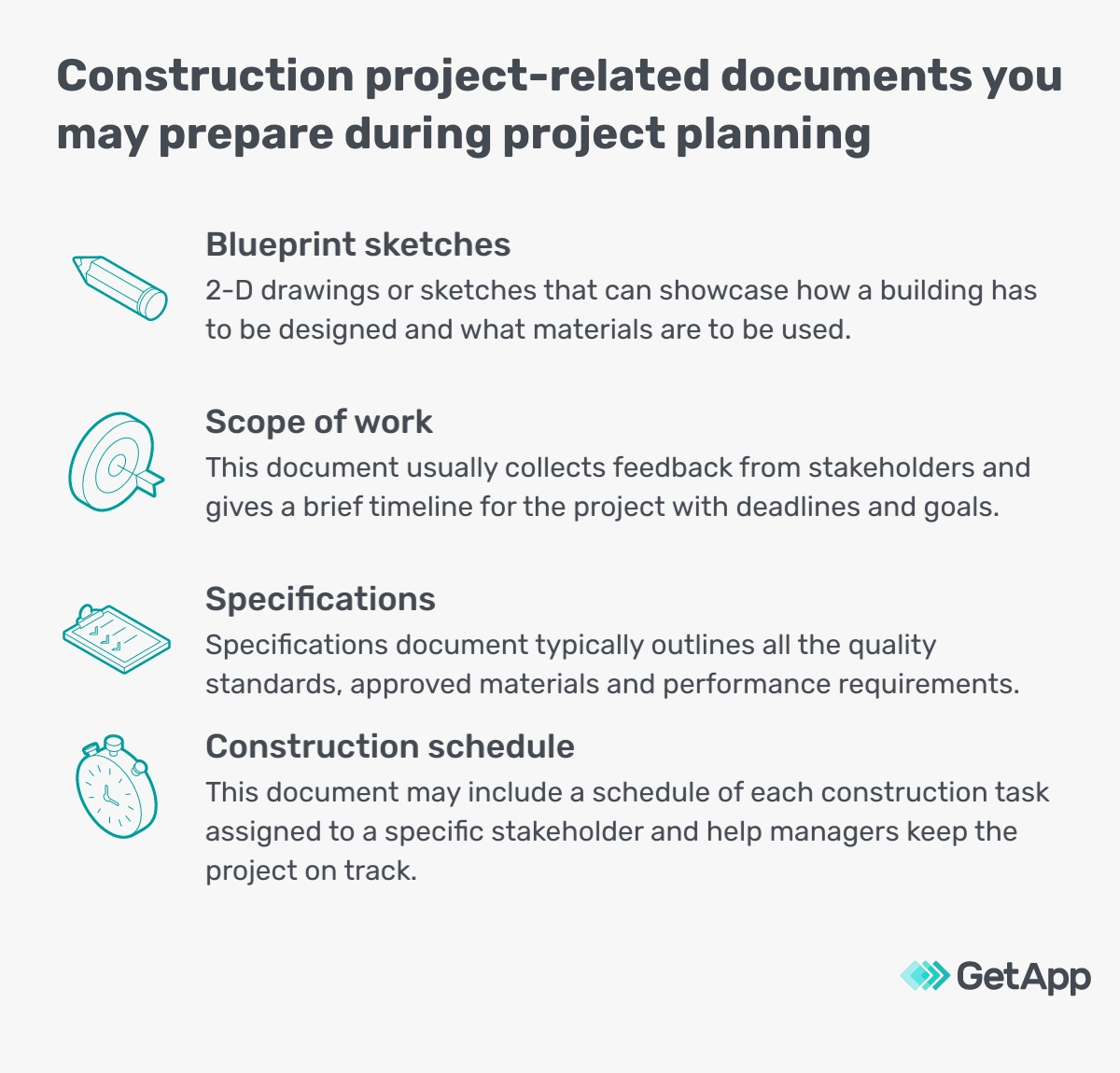This article was originally published on 01/18/2022.
A construction project’s success usually depends on a well-thought-out planning process. This article explains almost every aspect of construction project planning, how it can be executed and how construction management software can help achieve it.

In this article
Construction could potentially be the backbone of Canada’s economic growth and should ideally be planned using a suitable strategy. According to Randstad Canada, “The construction sector is a massive industry in Canada, employing approximately 1.2 million men and women, or approximately 7% of the Canadian workforce.” With the growing need for housing and infrastructure, general contractors could potentially face challenges while planning for construction and executing multiple projects.
In order to align with the client’s needs, a general contractor could likely benefit from using construction management software. In this article, we shall explore how to efficiently perform construction project planning and how construction management software could help make it possible.
What is construction project planning?
Construction project planning can be defined as a process managers execute to build a potential construction management plan that exhibits everything from its design to completion.
A construction plan usually includes:
- A document containing construction methods and approach
- Computer-aided designs, visual sketches and pictures
- A step-by-step workflow of construction activities
- A project schedule with timelines for each activity
- Participants and stakeholders of a construction project
With an organized plan, construction managers can ideally ensure that the workforce carries out all tasks timely and efficiently.
Let’s understand what usually goes into a construction project plan.
Steps to consider to execute construction project planning
Define project goals
Before you start working on a project, you should first lay out the project’s feasibility and define project goals.
Determining project goals may start with identifying who can be project stakeholders and how they can contribute to the project.
In this phase, you can:
- Decide preliminary budgets
- Assign tasks to specific stakeholders
- Calculate the estimated time of completion for each task
- Identify the material required for construction
In order to define the project scope, you may also need to outline everything from the project’s goals, deliverables, stakeholders, tasks and deadlines in a document so that everyone can have a clear picture of what needs to be done.

Create a project’s scope
After identifying project goals, you and your team can decide on the features and tasks the project should include to meet requirements. The project scope document created in this phase can also give insights into how to achieve specific goals.
It may include construction techniques that will be used and how the team will put together a schedule to accomplish all the tasks. Establishing performance metrics and analyzing project constraints can also be defined in a project’s scope before a project is implemented.
Execute the plan
Once you identify goals and create a project scope, you should ideally be ready to execute your plan. You can start by creating a project timeline to keep a tab on everything.
With a timeline in place, you may schedule a kickoff meeting with your team to go over a plan and prepare a roadmap of the next steps. You could also consider using construction scheduling software to track the plan's progress in real-time and manage deadlines assigned to specific stakeholders.
Monitor the performance of your project
After a project is executed, it may be essential to know if your team is meeting the goals you’ve set. Aligning goals may be useless if you don’t track your progress against those milestones.
A construction supervisor should potentially collect data using performance metrics that can help you track your project and make sure you’re meeting performance benchmarks.
To track the progress of your project, you may consider looking at the below performance indicators:
- Customer satisfaction ratings
- Number of person-hours
- Time to rectify defects
- Is the project on schedule?
- Is the work up to the quality?
Close and assess the project
Even after the construction of a building is completed, you should still collect data and feedback that can help you measure the success of your project.
Data gathered at this stage may help you efficiently approach your next project. You could learn what mistakes were made and how you handled them. In order to have all this data, you should potentially schedule a meeting with your team to discuss the performance and what you could have done better.
Construction management software could also aid in building collaborative workflow and bringing multiple teams into a shared environment. Let’s understand how features of construction management software can help streamline project planning.
What is construction management?
Construction management can be defined as the process of developing a strategy to design, plan, coordinate and monitor the construction process of properties. Such properties could include residential, commercial, government, and educational buildings, among others.
Software features you may consider for construction planning
Imagine you were to create your own garden, where you would need to first identify a suitable location, check for resources and equipment, plan your budget in case of additional requirements, and begin planting as per your design and strategy. Implementing a construction planning strategy seems similar to this approach.
General contractors may use construction management software to manage their workflow to implement such construction projects. However, they might get confused between multiple software solutions available. This is why we are going to explore a few features that could help general contractors understand how to use construction management software to their advantage.
Financial tracking
General contractors usually have to assess the amount of investment required during the construction planning stage. These investments could be earmarked for maintenance and repair, stocking resources, or even paying wages to workers. As construction planning for projects could range from building new infrastructure to just repair and maintenance, financial tracking solutions offered as part of construction management software —such as accounting modules— could help a general contractor manage financial tasks. This is why you should keep this feature in mind while choosing suitable construction management software.
Project reporting
Once a project has been commenced, a general contractor may need help to monitor the execution of several construction planning strategies and activities in various stages. In order to make this possible, some construction management software usually offer multiple construction modules that could potentially help automate tasks. Such tasks could include:
- updating schedules and notifying team members,
- providing risk assessments,
- checking completion status,
- and calculating the time required for individual assignments through dashboards and project tracking tools.
Moreover, a general contractor can also typically check on and help resolve issues while implementing construction plans and designs at earlier stages. This feature could help them generate reports on project status and budget requirements in a shorter span of time.
Inventory monitoring
During the construction planning and execution process, a general contractor may need to deal with issues like significant resources and inventory going out of stock. This could delay the construction process and push back the deadline for finishing a project. Using inventory monitoring modules, a general contractor could monitor inventory requirements regularly and ensure that they are met in a timely manner through automatic updates. This can also be done using features such as batch processing. According to Gartner, batch processing refers to the processing of an application’s data and programs individually, i.e., one process is completed before starting another one.
Documenting workflow
As a general contractor may have to perform multiple tasks to deliver the requirements of their clients and other stakeholders, it typically becomes important to document crucial details and information as well. The digital documentation module of construction management software could potentially help digitally record strategies, navigate different documents for reference, and even prepare and generate documents during construction project planning. This feature should ideally be considered to help a general contractor choose software that meets their digital documentation requirements.
While you select relevant construction management software for your firm, it may also be essential to look at its pros and cons.
Pros and cons of construction management software
Gardeners usually opt for suitable resources and equipment to create their gardens. Similar to gardeners, if general contractors could use suitable construction management software, it could ideally help them align with their construction planning strategies and streamline their workflows cost-effectively. We will now explore some key pros and cons of construction management software.
Can help improve safety
The use of construction management software could potentially enable general contractors to use advanced construction technologies - for example, sensor-based safety management solutions— to prevent any accidents. With this software, a general contractor may be able to identify risks beforehand and take measures accordingly.
Some such software also offer tools like hazard management which can help enhance safety, mainly while operating heavy construction machines, handling heavy construction materials, and using electrical devices.
Could aid in facilitating faster access to crucial information
During the construction process, a general contractor will likely generate official client approvals, design plans, and regulatory documents. It cannot be easy to store and access these documents. Using construction management software, a general contractor can conveniently access important documents and information, as they can be digitally stored and retrieved.
May be a costly investment
A general contractor could find it difficult to invest in construction management software solutions as they may be costly. As some construction companies are small to midsize enterprises (SMEs), this investment may not fit the project budget. As a result, the price of the software could potentially be a factor that could discourage a general constructor from opting for it.
May face downtime and offer a slow response
Construction management software could potentially help streamline the construction planning process. However —owing to a lack of technological infrastructure and resources— a general contractor could struggle to operate such software due to slow response or greater downtime (the time period when the system is not operational). For instance, due to an unstable internet connection, incompatible operating systems, system failure, and lack of supportive applications, a general contractor may face issues while operating these software.
To sum it up
The construction industry is gaining significant importance in the country. According to a report by CBC, the average cost of Canadian housing reached an all-time high in February 2022. In such a scenario, with an increasing demand for more housing, a general contractor can ideally meet their construction planning requirements and identify features that align with their needs using construction management software.

